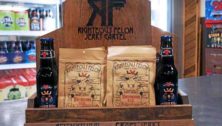Chester County Leadership: Tom Musser, Founder & Chairman of Tri-M Group
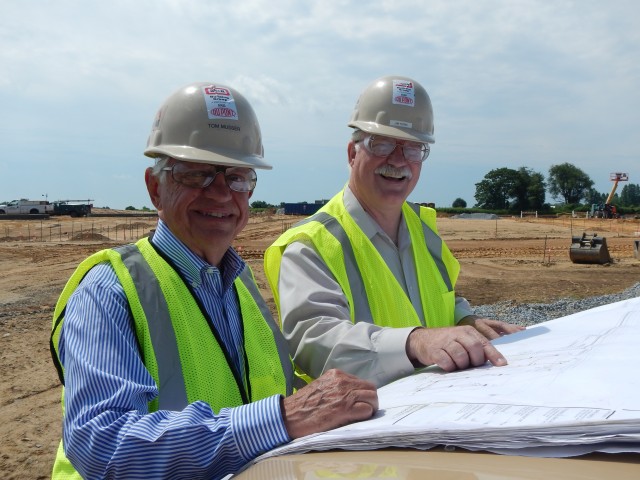
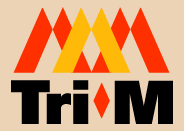 Publisher’s Note: This Chester County Leadership profile was originally published on April 7th, 2016.
Publisher’s Note: This Chester County Leadership profile was originally published on April 7th, 2016.
When the Chester County Economic Development Council inducts Tom Musser, Founder and Chairman of Kennett Square-based Tri-M Group, into its Business Hall of Fame this evening, they’ll be acknowledging Musser’s 52 years of “outstanding endeavors and achievements within the business community.” Since starting Tri-M Group with his brother Dick in 1964, Musser built the electrical contracting company into one of the leading electrical solutions providers in the eastern U.S., serving the likes of DuPont, JP Morgan Chase, Comcast, and Halliburton.
Tom spoke with VISTA Today about growing up in Sconnelltown a few miles southwest of West Chester, going to live with his aunt in St. Petersberg, Florida when World War II broke out, graduating from high school and going to work at Lukens Steel all while sensing punching a time clock everyday wasn’t for him, starting Tri-M two days after getting married in 1964 and the challenge of finding skilled workers to install the complicated electrical and mechanical systems his company designs.
Where did you grow up Tom?
I was born in West Chester in 1934, the oldest of three boys (we are Tom, Dick and Harry), and spent the first five years of my life in Pocopson Township outside of West Chester. The day after Pearl Harbor was bombed in 1941, my father went into West Chester and enlisted in the Navy. He spent the next four years in the Pacific theater fighting the Japanese.
While my father was away, our family structure loosened up a bit. For the next four years, I went to live with my mother’s cousin who had a small boutique hotel in St. Petersburg, Florida and she knew it would be challenging for my mother to raise three boys on her own.
That was a big deal for your dad to enlist and leave his family?
It wasn’t just him! An awful lot of young men just like him enlisted at the same time.
Did your family come back together again after the war was over?
Yes, my father was discharged in 1945. When he returned home my parents bought a small, non-descript house in Wawaset on Route 842 near Unionville and I also moved back to Pennsylvania.
What do you remember about growing up in St Petersburg or Unionville?
The small hotel my aunt had in St. Petersberg had about 30 rooms and was a place where people would book their reservations a year ahead and come and stay for the whole winter. She ran the place herself serving one meal a day, breakfast, to the guests. Even though we didn’t call it a Bed & Breakfast back then, it would almost qualify as that type of hotel. Watching my aunt run the hotel gave me my first inkling of entrepreneurship.
Did you have a job at the hotel?
Not really. I had chores like taking the trash out and much like the chores of any kids might have at home, but I wasn’t paid.
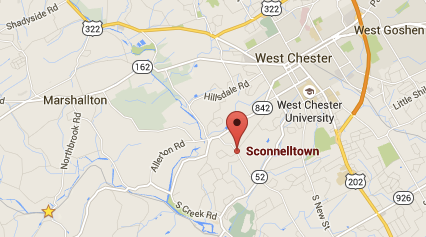 Where did you go to school, Tom?
Where did you go to school, Tom?
Before I left for Florida at the start of World War II, I attended a one-room school house in Sconnelltown. There were five rows of seats in the room, each row being a different grade. When high school came around, I attended Unionville High School.
Did you play any sports in high school?
I played a little bit of soccer, but I wasn’t much of an athlete.
Did you have any jobs in high school?
The community was agrarian back in those days. To make money I worked for local farmers. Right up the road from our house was a pretty good sized estate owned by a well-off gentleman who lived in Philadelphia and came out to his estate on the weekends. I worked on his lawn; mowed his grass, pulled weeds, dusted the roses and anything else he thought I should do.
My first real job was working for Lukens Steel in Coatesville when I graduated from high school in 1952. In those days, I walked in every morning and punched my time card. If I was two minutes late, I got two minutes less pay. Even though I loved every minute of my time at Lukens, I wanted more freedom and flexibility in my personal schedule.
What do remember about your time at Lukens?
On payday the company gave us our checks and we would walk out the gate and there sitting right outside the gate was an old gentleman from Coatesville who would cash everyone’s paycheck. In return for cashing checks, he kept the change. If your check was for eighteen dollars and twenty-five cents, he kept the 25 cents. That’s how he made a living. He was there every payday. That guy was an entrepreneur who found his niche and did OK. I liked that.
What lessons did you learn from your time at Lukens Tom that stay with you today?
The big thing especially as it relates to my business today is I loved big industrial plants. In fact, I would stay at the plant beyond my shift if I knew they would be pouring molten steel during the next shift. Interestingly enough, when we started Tri-M, we focused on the heavy industrial sector as opposed to the residential end of the business where so many others started.
What was there about the industrial sector that interested you?
That’s just the way my DNA came out. I like mechanical things. I like automobiles and internal combustion engines. I like to hear big trucks running. I guess I never grew up!
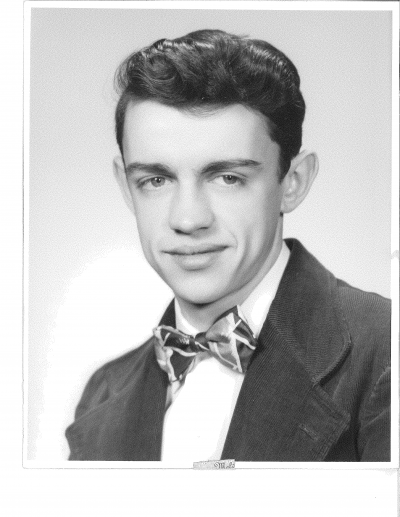
Did you go to college after high school?
Not right away. Instead, I went to work at Lukens and then moved on to several electrical contractors. As the youngest guy on the crew of one of the electrical contractors and the only one without a family to support, I told my boss to lay me off if business got slow, thereby protecting the jobs of men on the crew with families. I had a few bucks in the bank and knew I would be fine. Sure enough, business slowed down, and the contractor laid me off.
A couple of days later I hopped in my car and headed back to Florida and St. Petersburg to visit my aunt with the hotel. For reasons unknown to me to this day, I took a detour and visited the campus of the University of Florida. I drove around the University of Florida’s campus noticing the beautiful campus and the good looking young ladies. On the spur of the moment, I walked into the Dean of Admissions office and told him I wanted to enroll. He gave me a couple of forms to fill out and encouraged me to send him my high school transcripts when I got home. A couple of weeks later I got a letter saying I had been accepted!
Was the University of Florida a good fit?
It was, but, because I was financing everything myself, I ran out of money in my third year. This was 1956, and the draft was going full bore due to the Korean War. Although I had a student deferment, the minute I didn’t sign up for the next semester, I knew I was going to be drafted into the Army. Because my entire family had served in the Navy, I went and joined the Navy instead. I didn’t have much money when I got out of the Navy three years later and went back to work for an electrical contractor in Kennett Square instead of heading back to college.
Do you ever regret not having the college degree, Tom?
Only from a personal satisfaction point of view. Not having a degree did not impede either my progress or the business’ progress one iota. I was fortunate enough to find the engineers and business people to help me run my business. I may not have had the degrees they had, but I was bright enough to know whether they were bright enough to work in my business.
When did you decide to start Tri-M?
After I came home from college, I had an opportunity to go to work for a small electrical contractor and took it. I went from that small contractor to a little larger contractor and noticed that there was a niche not being addressed in area, industrial electrical contracting. The contractor I worked for would take on smaller industrial jobs, but his preference was residential. I knew there was an opportunity.
In 1964, I quit my job with the electrical contractor Friday night, married Bonnie Saturday morning and started Tri-M on Monday morning with my brother Dick! Of course, I forgot to tell my now wife I didn’t have any money or a job, a fact that she still reminds me of occasionally.
Was it hard getting Tri-M off the ground?
No, the business was there so getting work was not a problem. Because most of the electrical contractors I had worked for had worked for were residential contractors; they were happy to refer the industrial customers to Tri-M. We did a lot of work in the stone quarries, the aggregate businesses, and the anthracite plants. Back then there was a big firm in Kennett called NVF, National Vulcanized Fiber Company, that was expanding rapidly that we did a lot of work for.
Our biggest challenge right up front was finding the skilled workers we needed to perform the work the contracts we won called for. All these years later, that’s still our biggest challenge. Right from the very beginning, my philosophy was to hire people more for their attitude than their skills. I knew I could train people that had the right attitude, who wanted to work and that I could trust. As we grew I knew I did not know it all, so another philosophy was that I hired people who had the education needed to help grow the company and were smarter than I was.
It helped that we established a good relationship with a bank. They knew us personally and trusted us, and we honored every commitment we ever made to them.
You sold the company at one point. Why?
In 1998, we sold Tri-M to a public company. That turned out to be a bit of a mistake, and we ended up buying Tri-M back a couple of years later. When I bought it back, a good friend of mine became CEO and part-owner of the company which gave us a solid succession plan.
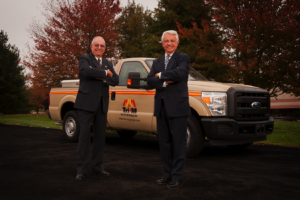
How did working with your brother Dick work out? Were there any sibling rivalries you had to work through?
It worked out fine. Fortunately, we’ve always gotten along very, very well. Dick let me lead the charge; since I had a few years of college under my belt and a couple of additional years in the electrical field than he had had. But we were a great team.
And now both your children, Traci and Tom are in the business.
Yes, and they’re both better educated and brighter than I am as well!
What challenges and opportunities are on the horizon for you or Tri-M, Tom?
I’m a big picture person. I don’t like detail. I’ve always been able to spot an opportunity. All businesses face threats and challenges. I’ve found that every challenge or threat is also an opportunity. Maybe something changes with one of our big customers, a leadership shift or a buyout happens, and the relationship changes. While situations like that are a threat, they’re also an opportunity to find another way to work with that customer. Even through we’ve been able to do that, continuing to do so demands great focus and concentration.
Finding highly skilled workers is a huge, huge problem in this country. Sooner or later the country has to wake up to that. In my opinion, we don’t need every student graduating from high school to get a college degree. Sometimes we push college a little too hard. Some students might be better suited to working in the trades. We need people at Tri-M with mechanical and electrical skills to install the complicated systems we design. We’ve had many super people here, without a college degree hanging on their wall, who have done super things for our business.
We are always on the lookout for people who want a career with us, not just a job, but a career. We work hard to provide career opportunities for our people. Not everybody takes advantage of those opportunities, and that’s ok. But we are proud of all the opportunities that we offer our employees.
What is the best piece of advice you ever received, Tom?
When you start out with as little money as we did, we were always nervous about whether there would be enough money to buy groceries and to sustain the business. Leonard Traines, who owned West Chester Electric Supply, an electrical wholesale house in West Chester and the first company to extend Tri-M credit, told me all I had to do to be successful beyond my wildest dreams was treat my customers honestly, with integrity and honor every commitment I made.
My definition of honor is when your handshake has the exact same meaning as a written contract. That was super advice that I’ve stuck to over the years.
Connect With Your Community
Subscribe to stay informed!
"*" indicates required fields






































![95000-1023_ACJ_BannerAd[1]](https://vista.today/wp-content/uploads/2023/03/95000-1023_ACJ_BannerAd1.jpg)







